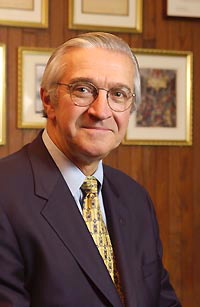|
This is an archived article.
For the latest news, go to the Advance
Homepage
For more archives, go to the Advance Archive/Search Page. |
||
The Huskies' success in basketball offers lessons we can apply in other University endeavors. It is a happening that, in these parts, goes by many names. Some refer to it as March Madness; others call it Huskymania; and for still others it is known simply as Hoopla. Call it what you will but ignore it at your peril. For four weeks this time every year, a pleasant sort of paralysis overcomes a percentage of Connecticut's population, as we become transfixed on college basketball in general and UConn basketball in particular.
As you read this, maybe, just maybe, both the UConn men's and women's teams will still be alive in their tournaments. After all, success in the tournaments is not only good for the programs and the University, but deep down inside most UConn basketball fans flat out enjoy the excitement and inner glow that comes from backing a winner. There is no denying that the desire to stand behind a winner, whether in sports or any other human endeavor, is a trait that has been synonymous with mankind since the beginning of time. For proof, just ask any long-suffering follower of Red Sox baseball, including myself. When it comes to academic medicine, people are no different. They want to stand on the side of success, not mediocrity, and certainly not on the side of failure. As I watched both UConn teams convincingly win their Big East tournaments and move positively into the NCAAs, I couldn't help but think how similar success on the basketball court is to success at an academic medical center. I'm not suggesting there is a simple recipe for winning in basketball or in academic medicine. There are, however, elements that have contributed to UConn's basketball success that we can learn from and apply to our activities at the Health Center. Recruitment of
Talent Retention of
Talent Aggressive, Team-Oriented
Goals There is a three-part lesson to be learned from this: First, set goals that are difficult to reach. Second, make sure the goals are truly for the good of the organization and not based on individual needs or desires. Third, work together and tirelessly to achieve them. I could cite several examples of where we are replicating that approach, but one effort in particular comes quickly to mind. Susan Whetstone, our chief administrative officer, has led the multi-disciplinary charge to identify financial improvements throughout our organization. That is far from easy, when one considers the dwindling reimbursements confronting academic medical centers. Yet Susan, with the help and support of many others, has achieved $18 million in financial improvements since 2000. Not wanting to rest on our laurels, I've challenged Susan and her team to accomplish even more over the next 18 months. I'm fully confident she will. External
Support As we have seen, if we take our eye off the ball - even for a moment - we risk losing support. There is no such thing as too much external support. Because we need all the "fans" we can get, every day is "fan appreciation day" at the Health Center, and each of us has an ongoing responsibility to help attract "fans" to our program. Most often, this is easily done by being available, affable and informative. "Remarkable Care Through Research and Education" resonates with everyone, because it is responsive to their core need, good health. Please accept my apologies if I have overused the basketball analogies. I merely hope to take advantage of March Madness to illustrate that winning and success have common roots, regardless of the venture or the venue. We can not only take pleasure from UConn basketball, but inspiration. Be peaceful (and go Huskies!). |

